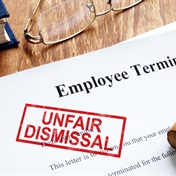
- An amended Code of Good Practice on the Prevention and Elimination of Harassment in the Workplace came into effect in March this year.
- The reach of the code is now much wider in order to deal with an increasingly diverse workplace.
- The test for harassment takes into account whether it was unwanted, the nature thereof and the impact on the victim - it is no longer acceptable just to say, "I did not mean it".
Passive aggressive behaviour, bullying, ostracising, cyberbullying, career sabotage, and racist, sexist or LGBTQIA+-phobic language are just some of the many forms of harassment in a new, wider code of conduct for the workplace on which victims can rely to get employers to take action.
While there had been no proper concept of bullying in the workplace before, the amended code now provides that any form of harassment must be dealt with by means of an investigation and either a formal or informal disciplinary process. Perpetrators and victims can now include anyone working at or visiting the business premises.
Government amended the Code of Good Practice on the Prevention and Elimination of Harassment in the Workplace to deal with an increasing diverse workplace. The new code came into effect on 18 March this year.
"Harassment is a form of unfair discrimination in terms of the Employment Equity Act [EEA], which makes provision for the issuing of Codes of Good Practice intended to provide employers with guidelines. The workplace is becoming more diverse, leading to an increase in workplace and corporate bullying. As such there was a need for wider protection of employees when it comes to harassment," explains labour law expert Sunil Hansjee of Cox Yeats.
Employers who fail to take adequate steps to eliminate harassment within a reasonable time may render themselves vicariously liable for damages even if the harassment consists of a single incident.
A recent high court judgment found the employer and the harasser jointly and severally liable to pay the plaintiff R4 million in damages for their failure to adequately deal with a case of sexual harassment in the workplace.
"Employers should develop clear procedures to deal with harassment which enable the resolution of problems in a gender-sensitive, confidential, efficient, and effective manner. When an employee has reported an alleged incident of harassment or laid a complaint, the employer is obliged to investigate the allegation of harassment and advise the complainant of the procedures available to deal with the harassment," advises Hansjee.
The test for harassment takes into account whether it was unwanted, the nature thereof and the impact on the victim.
"It is no longer acceptable to say 'I did not mean it' or 'the person misunderstood'. The code is now extremely broad and takes how the complainant experienced the behaviour into account," says Hedda Schensema, an employment law expert at Cliffe Dekker Hofmeyr. "We often hear 'there is a bully among us, but he performs very well and gets things done'. The amended code, however, makes bullying no longer acceptable."
As for harassment on the basis of race, Bonagni Masuku, another employment law expert at Cliffe Dekker Hofmeyr, says the test is "anything said or done in the context of the workplace that is reasonably capable to convey a racist meaning to a reasonable person on a balance of probabilities". It is, therefore, not only an objective test, but also broad in nature.
The different types of harassment
- Physical harassment includes physical attacks, simulated, or threatened violence, or gestures (such as raising a fist as if to strike a person or throwing objects near a person).
- Verbal bullying may include threats, shaming, hostile teasing, insults, constant negative judgement, and criticism, or racist, sexist or LGBTQIA+-phobic language.
- Psychological harassment in the workplace may be associated with emotional abuse and involves behaviour that has serious negative psychological consequences for the complainant/s such as is often the case with verbal abuse, bullying and mobbing.
- Slandering or maligning an employee or spreading malicious rumours.
- Conduct which humiliates, insults or demeans an employee.
- Withholding work-related information or supplying incorrect information.
- Sabotaging or impeding the performance of work.
- Ostracising, boycotting, or excluding the employee from work or work-related activities.
- Persecution such as threats, and the inspiration of fear and degradation.
- Intolerance of psychological, medical disability or personal circumstances.
- Surveillance of an employee without their knowledge and with harmful intent.
- Use of disciplinary or administrative sanctions without objective cause, explanation, or efforts to problem solving.
- Demotion without justification.
- Abuse, or selective use of, disciplinary proceedings.
- Pressuring an employee to engage in illegal activities or not to exercise their legal rights.
- Pressuring an employee to resign.




 Publications
Publications
 Partners
Partners












